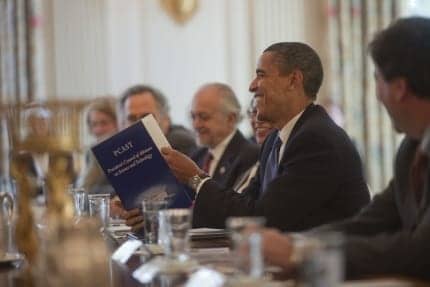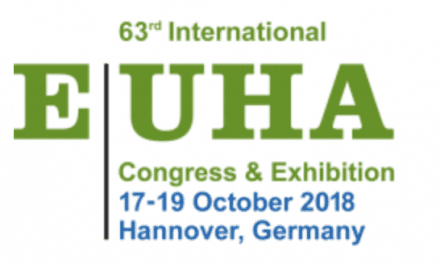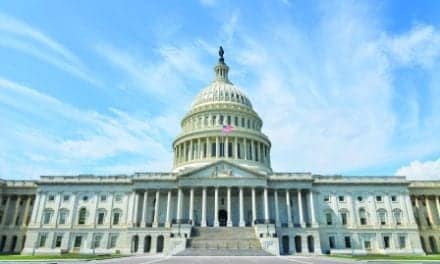On Friday, October 23, 2015, the President’s Council of Advisors on Science and Technology (PCAST) held an open teleconference to discuss its report, Aging America & Hearing Loss: Imperative of Improved Hearing Technologies. PCAST voted and approved the report, which is slated for publication in the coming weeks.
PCAST Slides outlining its study analysis and recommendations are available for downloading here.
The PCAST report makes four specific recommendations regarding hearing loss and hearing technologies:
- FDA should designate as a distinct category “basic” hearing aids—non-surgical, air-conduction hearing aids intended to address normal, bilateral, gradual onset, mild-to-moderate age-related hearing loss—and adopt distinct rules for such devices. The FDA should approve this class of hearing aids for over-the-counter (OTC) sale, without the requirement for consultation with a credentialed dispenser, and should also approve for OTC sale (retail and online) tests appropriate to the self-fitting and adjustment of OTC devices by the end user. Such hearing treatments and tests meet the FDA requirements for OTC products, which are that consumers should be able to self-diagnose, self-treat, and self-monitor the condition.
- The FDA should withdraw its draft guidance document regarding Personal Sound Amplification Devices (PSAPs) and reference this new category as “devices for discretionary consumer use.” PSAP manufacturers should continue to be able to make truthful claims about their use in normal settings, and FDA should not require language in PSAP labeling or advertising that excludes their use by individuals with age-related hearing loss no worse than mild-to-moderate.
- Analogously to its “Eyeglass Rule,” FTC should require audiologists and hearing-aid dispensers who perform standard diagnostic hearing tests and hearing aid fittings to provide the customer with a copy of their audiogram and the programmable audio profile for a hearing aid at no additional cost and in a form that can be used by other dispensers and/or hearing aid vendors. Additionally, the availability of a hearing test and fitting must not be conditioned on any agreement to purchase goods or additional services from the provider of the test.
- The FTC should define a process analogous to contact lenses (ie, “Contact Lens Rule”) by which patients may authorize hearing aid vendors (in-state or out-of-state) to obtain a copy of their hearing test results and programmable audio profile from any dispensing professionall who performs such a test, and it should require that the testers furnish such results at no additional cost.
The Hearing Industries Association (HIA) reports that it strongly disagrees with the PCAST recommendations for the reasons outlined in its white paper, “Patient Care and Positive Outcomes: The Focus of Hearing Health.” The HIA white paper was presented to both PCAST and the Institute of Medicine’s (IOM) Committee on Affordable and Accessible Hearing Healthcare for Adults. In the paper, HIA emphasizes that hearing loss is a complex condition requiring professional involvement and sophisticated technology, and that elimination of either of these risks masking more serious conditions (FDA “Red Flags”) while increasing the likelihood that people with hearing loss will fail to receive adequate treatment. HIA says that the PCAST recommendations disregard both elements laid out in its white paper.
In its related announcement, HIA reports that it will be responding to the numerous errors in the PCAST report, and will craft a comprehensive response strategy at a November meeting of the HIA Board.
PCAST members reportedly conducted interviews and gathered information this summer in advance of a public meeting held in September to discuss and develop its recommendations. Although PCAST has no regulatory authority, its recommendations may be considered by various regulatory agencies and institutions.
The Institute of Medicine’s (IOM) Committee on Affordable and Accessible Hearing Healthcare for Adults is conducting its own meetings and analysis of hearing aid affordability and access, as covered in an October 22, 2015 Hearing Review article. Additionally, Hearing Review also reported in detail on the third and final scheduled public meetings held by the IOM Committee.
Source: HIA, PCAST






We all know that this is a price and access issue for services for the hearing impaired. Medicare recipients have long complained that hearing aids are a non-covered service and that they cannot afford hearing aids. Senators are well aware of the access issue of their Medicare constituents. Access to hearing healthcare should not be considered a price, access or political issue rather a potential consumer (client) safety issue. The PSAP e.g. “devices for discretionary use” may be used for those individuals who self diagnose their hearing loss which is not without consequences. At the very least we should pursue legislation requiring audiologic and otologic assessment prior to purchasing an UNDER-the-counter devices with a prescription. The FDA uses the analogy of purchasing OTCs similar to the purchase of eye glass readers in a pharmacy. A better analogy might be the sale of OTC hearing devices to purchasing contact lenses which require a refraction (prescription) for purchase. OTC is a dangerous idea and I am amazed that the FDA supported this. Caveat emptor.
It’s time consumers can get an affordable, professional product. We wear “cheaters” for our eyes…and Simple Ear is a pre-programmed “cheaters” for ears that give consumers a mild to moderate boost in their hearing.
This is the same president that brought us the Affordable Care Act. The best strategy is to ignore these recommendations and do whatever is needed to replace the people that drafted them. Enough said
FYI, the HIA link on this page leads to the Hawaiian Ecosystems at Risk project…..HEAR
Thanks Kathi. It should have led to hearing.org not hear.org!